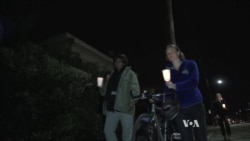Members of the North Oakland Restorative Justice Council walk through a neighborhood holding candles to remember Eric Harvis, a man killed here last month in a street robbery. This would have been his 42nd birthday.
Several members of the group have lost loved ones to violence, and one of the organizers, known as Auntie Frances, said these kinds of events help.
“To add some healing in the community, to touch some lives, some family lives, to just let people know who have been victimized that there is some healing, there is some love,” she said.
Crime rates in Oakland are among the country's highest, and the city has a history of tensions between its African-American population and police. Gary "Malachi" Scott wants to be part of the solution. The 32-year-old man spent most of his adult life in prison for second-degree murder for a crime he committed as a 15-year-old boy. He said a prison program helped change his life.
“We had surrogate victims come in and speak to share their stories, to share how they have been harmed by people who have committed violence to them and to their families," Scott said. "And seeing that really set with me in a way that I knew that I cannot live this way again, I cannot hurt anybody in the way I did again.”
Downtown revitalized
Despite the crime, Oakland is attracting new residents and becoming a vibrant center, said City Councilman Dan Kalb. The city is ethnically diverse, and the downtown region has been revitalized, attracting artists and high-tech professionals.
"It also means that the price to live here is going to go up high, and so that’s one of our biggest challenges — improving our housing affordability both for people who rent and people who want to own," he said. "It’s becoming too expensive.”
A high dropout rate in the schools is slowly getting better. More than two-thirds of the city’s students are graduating, partly thanks to programs like one from the group Safe Passages, which teaches kids to use their skills as street artists to decorate and sell T-shirts. Jonathan Brumfield runs the program.
“They take what people call graffiti and use that to speak out about social justice issues, about issues around education, for instance, issues around health, violence, crime, police,” said Jonathan Brumfield, who runs Safe Passages.
Young people get job training at one of many programs run by another nonprofit group, Youth Uprising. One group of youngsters runs a cafe.
Youth Uprising's Sikander Iqbal said Oakland has the same issues as many other American cities that have large minority populations and pockets of poverty.
“Whether it’s in parts of New York, St. Louis, Detroit, Oakland, East L.A., you’re just going to run into a lot of the same outcomes, a lot of the same sentiments, a lot of the same feelings,” Iqbal said.
Making a difference
But many of the cities are tackling their problems, and the changes are having an impact.
The North Oakland Restorative Justice Council was recently given the Torchlight Prize by an organization called the Family Independence Initiative as a community organization that’s making a difference. The Initiative’s vice president, Mia Birdsong, said the organization is an example of the energy of the inner city.
“And we have forgotten that some of the most amazing innovation and creativity and capacity actually exist in low-income communities,” she said.
Birdsong said that despite the urban problems, change is happening in Oakland and in cities around the country.












